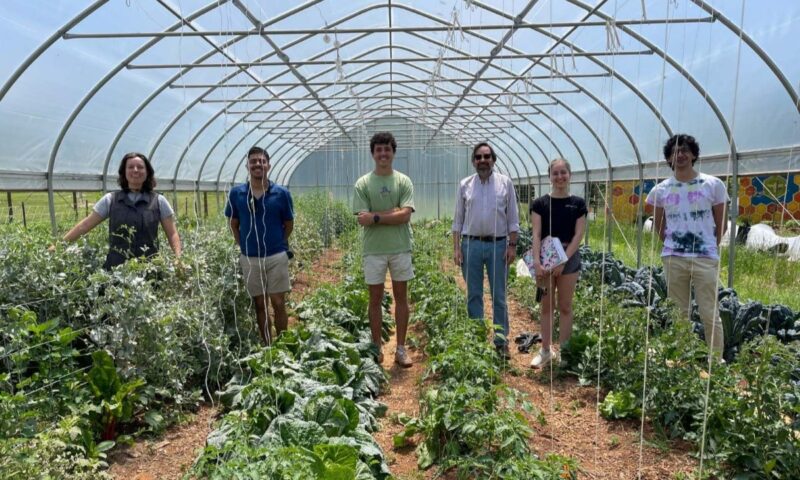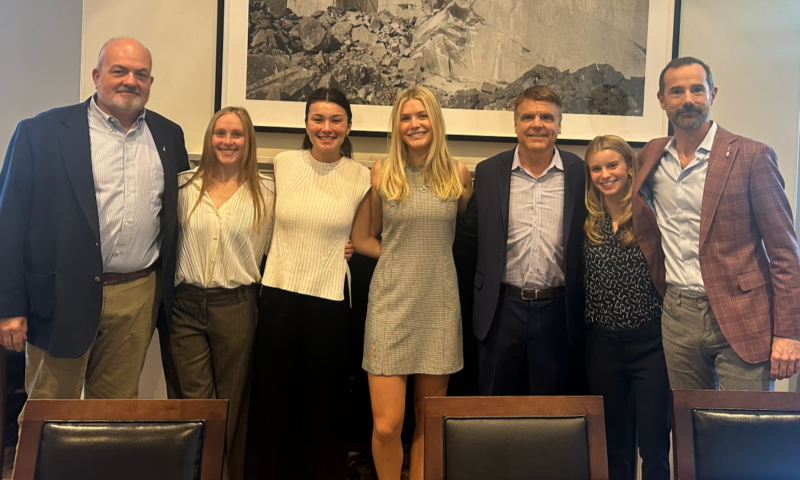Many students at UVA are intent on making a positive impact. Not all of them find themselves able to make it happen during their time as undergraduates at the University. Yet five students in the Commerce School’s Entrepreneurship Minor have taken the lessons of the program to heart and applied what they’ve learned to launch their own consulting firm and help support local business.
The minor offers practical, hands-on methods for successfully cultivating the mindset and essential skills that all areas of the entrepreneurship’s wide-ranging field demand. And though the program routinely provides a platform for initiating ventures that encompass various applications, solutions, and enterprises, the harsh realities that have threatened small businesses during 2020’s pandemic have served as a timely impetus for a group of students who embody the Entrepreneurship Minor’s ethos of being “relentlessly resourceful.”
Each of the five students was drawn to enroll in the minor because of longstanding interests in the subject, as well as curiosity about adjacent business areas such as corporate innovation, product development, venture creation, and management.
Ultimately, when it came time to create an experiential project for the minor’s capstone course, the fourth-years chose to apply their consumer-focused knowledge and their ability to deftly identify problems, design promotional strategies, and effectively work as a team by founding Thrive Consulting Group. Their first client? UVA Corner restaurant Pronto.
Inspiration to Activation
The students brought a portfolio of different strengths to the group effort, completing different concentrations in the minor: Sarah Wartel (A&S ’21) chose Innovation in Business; Liza Arnold (A&S ’21), Makdes Berhanu (A&S ’21), and Emily Kellam (A&S ’21) took the Social Entrepreneurship route; and Kush Patel (Engineering ’21) opted for Technology Entrepreneurship. The five also represent different disciplines from across Grounds, with Wartel double majoring in Economics and Spanish, Arnold and Kellam majoring in Media Studies, Berhanu studying Political Science, and Patel completing a degree in Computer Science.
As such, each took on specific roles playing to their strengths, such as risk management, digital marketing, communications, financial analysis, technology analysis, and graphic design. The responsibility of the positions created opportunities for relevant career experience and the ability “to make a difference and develop compelling solutions,” as Wartel puts it.
Arnold notes that the pandemic has exacerbated an already-existent gap in small business consulting services, and that dearth inspired them to launch Thrive for their capstone project. Wartel says that they realized they could hope to make the greatest immediate impact by applying their own business model in the real world by working with a local small business in need of assistance.
“Instead of creating a product or revenue-generating business model for a new company, we decided that our skills were some of the most valuable assets we had and that they could be turned into a business to help other businesses,” further explains Kellam.
Referencing the aforementioned gap Arnold mentioned, Patel says, “Small businesses provide a very specific value proposition through their specialized skills, but these owners may not have the skills needed to properly manage their finances or market their business, or to generate organic growth.”
The new consultancy emboldened them to put what they learned in their Entrepreneurship courses into practice. Yet considering the current climate, finding a company to assist didn’t come easily.
“Early on in the capstone course, we went door-to-door to places on the Corner with a flyer about Thrive,” says Arnold. “We came across a lot of places that were still closed due to the pandemic, as well as places that were short staffed. This made it difficult to get to the actual owners we had hoped to partner with.”
Berhanu believes that “a lot of persistence and a bit of luck” are to thank for finding a client in restauranteur Johnny Garver.
“The grassroots strategy paid off so that we were able to get right into what our client’s goals were and assist in the process,” she says. “We worked with Johnny from mid-September until now to build out Pronto’s social media presence and to set guidelines for social media use going forward. We have left Johnny with digital assets for his website and social media accounts, and conducted some market research that will be useful in understanding Pronto’s consumer base.”
Focusing on crafting promotions through social media with special attention to the Generation Z demographic that represents the largest segment of the establishment’s customers, the group’s creative assets have increased awareness and raised the profile of Pronto.
Purpose Driven
Arnold says that conceptually, the group envisioned Thrive as a venture structured and motivated by a genuine altruism, above anything else.
“Initially, we knew what types of services we could offer people, but COVID-19 forced us to be agile in adapting to what the businesses we partnered with needed during such turbulent times. The circumstances contributed to our decision to be pro bono, because we didn’t think it made sense to charge people who were already struggling to keep their doors open.”
Berhanu says that Thrive itself came to represent social entrepreneurship: a response to hardship by those with a desire to help.
“Driven by empathy with a purpose and a culmination of diverse backgrounds, we were challenged to expand what we each thought we were capable of accomplishing. With a solid foundation in business from McIntire, we were able to step out of our comfort zone and handle setbacks, knowing that this was a part of the process,” she says.
The process of self-reflection allowed the group members to find their strengths, support each other, appreciate their expertise in disparate academic areas, and connect through their commitment to persist and meet their shared goal.
“I was excited to have complete autonomy over digital marketing strategy ideation as well as company branding,” Berhanu says. “What became the most fun challenge for me was focusing on how we wanted to visually and verbally present ourselves. Connecting our story through visual representation and strategic promotion was highly gratifying.”
Those connections included the chance to partner with NBC29 as a higher-profile way of sharing the importance of their goal as active members of the Charlottesville community.
New Views and Next Steps
Being part of both the minor and Thrive Consulting Group was instrumental in changing the students’ understanding of the concept of entrepreneurship.
“Personally, I kind of fell for the misconception that entrepreneurship is all about flashy apps and revolutionary products, but I realize now that it means so much more than that,” Arnold says. “My experience with Thrive has also deepened my passion for social good through the lens of entrepreneurship, and I think that is something that will play a role in my ventures going forward.”
For Berhanu, being involved in the courses and the venture confirmed her belief that entrepreneurship cannot be taught like other disciplines.
“I have learned that you have to have a desire to begin, a purpose to keep you going, and an amazing group of teachers and colleagues around you to see it through. From the first day I stepped into the introductory-level course, I knew that this is where I wanted to be, and it has been such a pleasure to evolve alongside the department. It has been a privilege to be surrounded by inspiring individuals who have such a deep desire to change the course of what has been done before.”
She also says that the knowledge and support of Professors Eric Martin and Doug Duenkel (McIntire ’92) were instrumental to launching Thrive. “They were always eager to provide guidance whenever we asked and were highly transparent in the times when they felt like we could push ourselves a bit more. Overall, this led us to accomplishing a lot more than we would have thought possible.”
Arnold agrees that Martin and Duenkel were critical to the group’s success. “During each class session, they offered invaluable insight, advice, and critiques. They guided us through getting started, finding clients, managing client relations, and ultimately deploying our services. We are very thankful for the assistance they provided us in making Thrive what it is now.”
What Thrive actually is at the moment remains a work in progress. The NBC29 news coverage produced potential leads for future clients, but Arnold says that the experience and real-world application of skills that the venture provided this semester can benefit all students. Berhanu says that they are intent on creating a sturdy infrastructure to accommodate future growth. As the fourth-year students move closer toward graduating, they are still deciding how to manage Thrive, include other students, and support more Charlottesville-based small businesses.
But that kind of open-endedness is to be expected by the students at this stage. Ambiguity and the borderline cliché idea of “getting comfortable with being uncomfortable” are integral to what makes entrepreneurs who they are; how they think; and what they are capable of achieving through collaboration, creativity, and perseverance.



